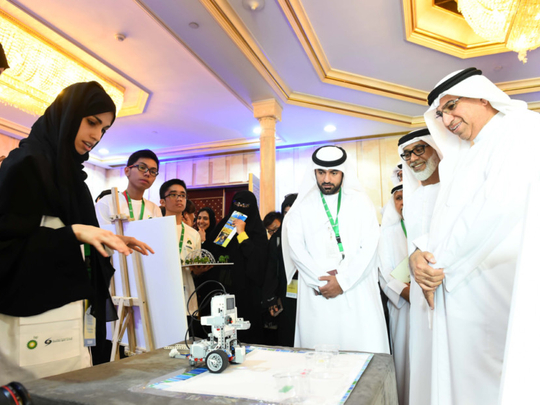
Abu Dhabi: Schools that have joined the Sustainable Schools Initiative in Abu Dhabi have decreased their annual carbon emissions by six tonnes over the last two years, while daily water consumption per capita has fallen by two litres.
In addition, since the start of the initiative by the Environment Agency Abu Dhabi (EAD), there has been a 50 per cent increase in the number of students pursuing further studies in environmental and ecological fields, said Rasha Al Madhfai, section manager for sustainable schools at EAD.
“It has been nine years since the initiative was introduced, and we have seen unwavering commitment from schools and their eco clubs towards preserving and protecting the environment. It is these simple steps that will eventually contribute to making the emirate more sustainable,” Al Madhfai told Gulf News.
She was speaking on the sidelines of the fourth Eco Club Summit on Wednesday, which explored various ways in which schools could get involved to improve their ecological footprint.
A total of 148 schools in the emirate have environmental clubs, and membership in these groups has steadily grown since the launch of the initiative. All clubs undertake annual audits to measure environmental impact, and work to continually maximise resource use.
According to the EAD, 82 per cent of these schools recycle their waste, 81 per cent practice partial recycling of electronic waste, and 60 per cent of them recycle their wastewater. In addition, 22 schools currently use renewable energy sources while 81 of them compost organic waste. The green spaces in 116 schools are also enhanced through the use of water-efficient native plants.
“An added benefit is that the students who invest their time in these projects become more empowered and sustainable, and go on to believe they can make an impact towards creating sustainable communities,” Al Madhfai said.
A total of 348 projects were showcased at the summit.
Raghad Raed, a grade 11 Jordanian student at Liwa’s Al Huiteen School, said their model of the aquaponics farming system was inspiring local farmers to look for more sustainable farming practices.
“We set up our 400 square metre facility a year ago, in which we introduced tilapia fish to an aquaculture tank and connected it to a hydroponic farm. We now have promises from three to four farmers to set up similar structures. We are continuing to create awareness about how the nutrient-rich water is especially efficient at making crops grow faster,” she said.
Another project at Bright Riders School collected 368kg of electronic waste, including discarded cellphones, tablets, televisions and wires. These items were then handed over to a recycling facility.
“We know that upto 80 per cent of closed landfills are composed of electronic waste, and we want to encourage residents to sustainably dispose of such items,” said Sonia Bhat, a 10th grader from India who is part of the school’s eco club.












